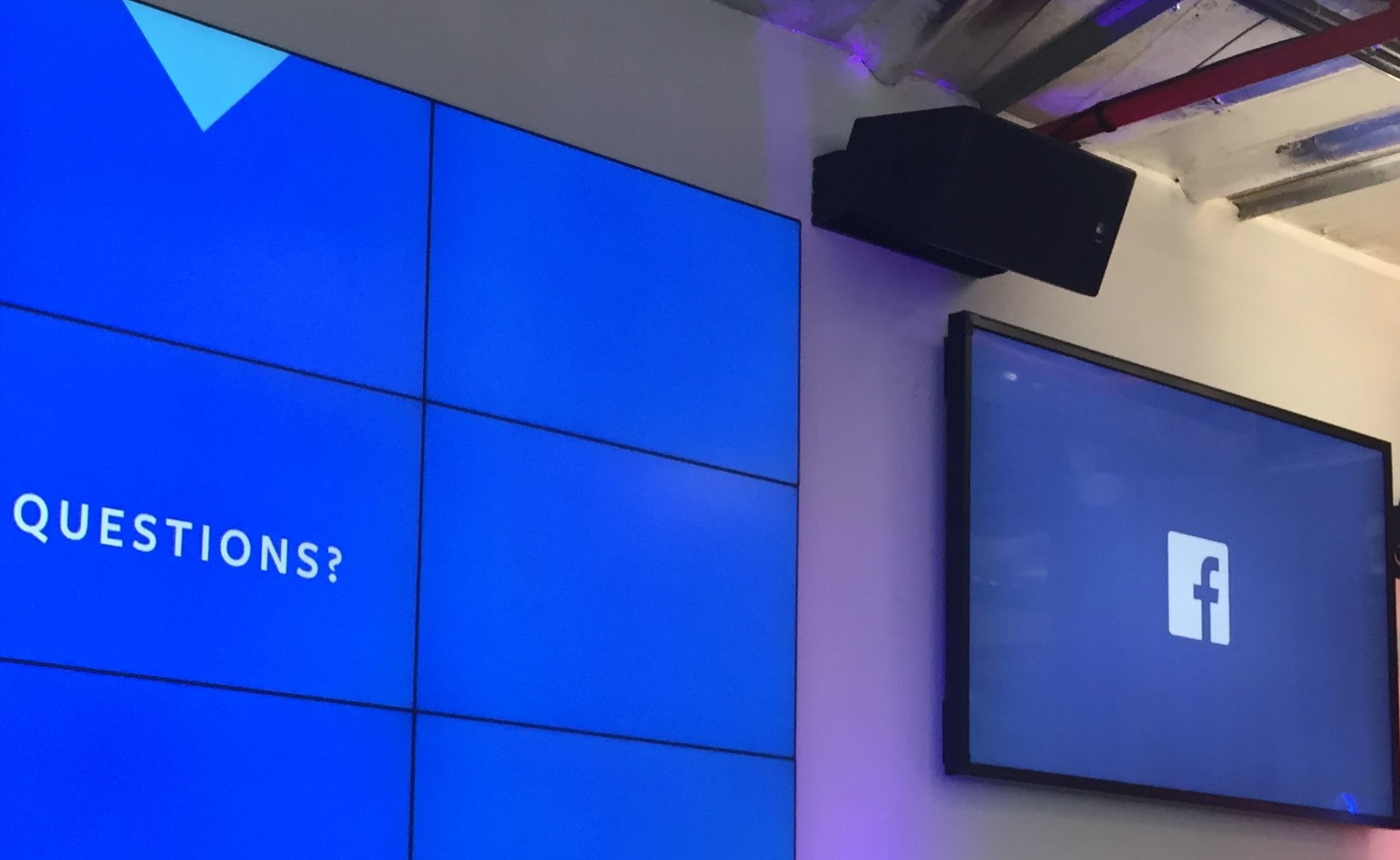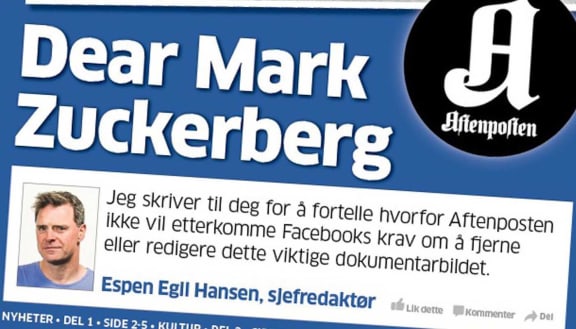Stuff says Facebook is not compatible with its own “core public values” and it's "pausing its presence" on the social media giant. The move has raised eyebrows in the media - and New Zealand’s most popular publisher of online news will lose eyeballs as a result. But Stuff is backing up its new owner's fighting talk.

The news business has questions for Facebook. Photo: PHOTO / RNZ Colin Peacock
Not long before striking a $1 deal to buy the company last month, Stuff chief executive Sinead Boucher made it clear she was no fan of Facebook.
“They have built businesses off the quality content others have created,” she told Mediawatch in April.
“News companies like us haven’t seen any of the benefits.
"We stand opposite to them in a lot of ways and it is good for us to keep them at arm’s length - because the work we produce, the code of ethics we adhere to and the fact that we produce journalism that is fair and balanced is at odds to Facebook and the fact it permitted massacres to be live-streamed, and personal data to be misused to manipulate elections."
She also told Mediawatch she objected to Facebook propagating conspiracy theories that Covid-19 was caused by 5G technology.
“Those things are damaging and we need to stand in opposition to that."
Now she has.

Sinead Boucher Photo: supplied by Stuff.co.nz
Boucher also backed the Australian government’s efforts to tackle the market dominance of Facebook and Google and said our government should follow suit.
Along with other media executives, she has urged the government not to spend public money on Facebook advertising - she would, of course, prefer to see the ads placed with New Zealand media companies, including hers.
Both Google and Facebook have invested in support for online journalism, such as the Facebook Journalism Project and the Google News Initiative. Both have launched tools to help media outlets secure paying subscribers and visited New Zealand to promote them.
“I haven’t had any meetings with Facebook,” she told Mediawatch in April.
“That’s not to say they haven’t reached out but the sort of things they offer don't help us in any way."
Today’s announcement reported by The Spinoff that Stuff had “ceased all activity” on Facebook and its partner networks such as Instagram in a trial until further notice won't have surprised staff familiar with her views - and it’s not the first time the company has acted on them.
After the atrocity in Christchurch in March 2019, Facebook’s role in live-streaming it - and its slow and initially ambivalent response - persuaded Stuff to stop paying Facebook to boost posts (a common way of increasing lucrative online traffic) and Stuff stopped advertising itself and its events on the platform.
Stuff also decided it was time to civilise the often unpleasant space "below the line".
It stopped publishing online comments on news stories about the topics that got readers the most wound-up - including the mosque shootings, 1080, climate change, suicide and even transport.
Many other local media outlets had already abandoned comments for similar reasons (including RNZ, which dropped them just a year after introducing them, after it didn’t act quickly enough when unpleasant and extreme comments appeared on Checkpoint’s Facebook page).
“In an era when many media outlets simply outsource comments to the unmoderated wilds of Facebook, we continue to see value in a curated conversation,” Stuff's chief editor, Patrick Crewdson, said at the time.
But online engagement with the audience is vital to any media company operating in the online era, so why would Stuff cut off such a critical conduit?
“We get 7000 comments a day from a daily audience of 1.2 million unique browsers. It's actually a drop in the bucket," Crewdson previously told Mediawatch.

Patrick Crewdson Photo: FAIRFAX MEDIA NZ
Facebook was the biggest part of the "bucket".
On any given day, several Stuff staffers around the country were posting Stuff’s content to Facebook at all hours.
On Monday, Crewdson told RNZ readers could still share Stuff stories from their own Facebook feeds, but the plethora of accounts for Stuff’s various sections’ and mastheads became officially “dormant” from Monday morning.
“Seven hundred and 50 large companies around the world are boycotting Facebook in terms of ads because is is not doing enough on fake news and hate speech,” Crewdson said.
Less online traffic back to Stuff’s site means less income per advert placed on the site, so pulling content altogether will come at a cost, though Crewdson is not sure what that will be.
“We’re going to measure the impact of this but we have a large loyal audience that comes directly to us each day. Some which come via Facebook will come directly,” he said.
Cutting the cord?
It remains to be seen if other local media companies will follow their lead, but some community groups and forums have already abandoned Facebook.
Online tech forum Geekzone no longer publishes on Facebook.
“Good on Stuff. It's a risky move but ethically the right thing to do. Hopefully the recent global movement against Facebook will continue to snowball,” one Geekzone user said today.
The move will also please those who have long argued local media should distance themselves from the tech titans.
In 2018, Dr Merja Myllylahti, research fellow at AUT’s School of Communication Studies, said local media had become dangerously dependent on Facebook and Google for online traffic. Her research showed the online platforms' share of digital ad revenues was growing, but New Zealand news organisations don’t make any substantial revenue from Facebook.
Dr Myllylahti said publishers were making the same mistake with Facebook news distribution as they did with their online news sites 20 years ago when they decided to make the content available for free.
“Chasing clicks did not provide them with a sustainable revenue model, and chasing users attention is not working for them either. Facebook user numbers are declining in some major markets, and if the user numbers decline, so will the potential audience for news companies. Why do they stay on the platform?," Dr Myllilahti asked.
Lessons from Norway?

Espen Egil Hansen called out Facebook's Mark Zuckerberg in a campaign about censorship of images in 2017. Photo: supplied / Aftenposten
She told Mediawatch there were other publishers New Zealand media could learn from, such as Norwegian company Schibsted.
"They have a paywall and they built their model outside of Facebook and social media," she said.
Schibsted combines all its digital publishing in Europe and has a mobile-focused news platform Omni in a bid to to push back against Google and Facebook.
But that’s easier said than done in New Zealand.
Back in 2016, Stuff (then Fairfax Media) joined New Zealand’s other biggest news media companies TVNZ, MediaWorks and NZME in KPEX - a joint venture to sell digital ads.
This was billed as a “premium alliance” that could offer advertisers a “brand-safe” environment - unlike Facebook and Google which blends legitimate and fake news and real ads alongside scams.
But those four media companies pulled the plug on KPEX last year.
Like Stuff, Schibsted confronted Facebook over its ethics in 2016 when it ‘censored’ the paper’s journalism. The government got involved and it had leverage because Norway’s massive state sovereign wealth fund has a 1.4% shareholding in Facebook.
In June, it backed six activist shareholders’ initiatives to reform Facebook’s oversight of questionable content.
All were rejected by the Facebook management, but it highlighted the growing concern over Facebook’s ongoing ambivalence about the content it publishes.


